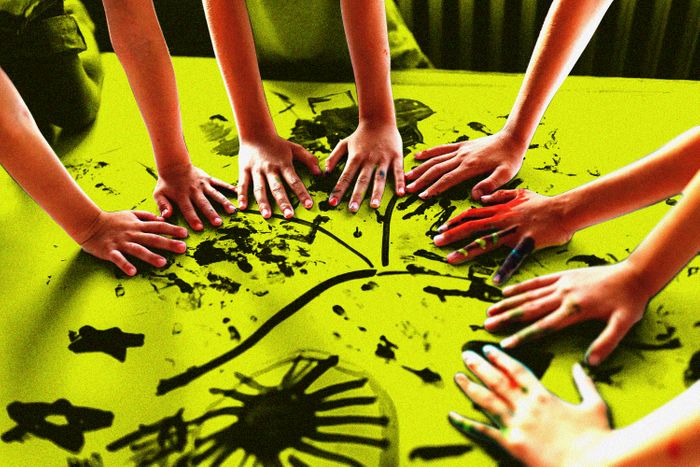
With weeks to go until kids return to New York City schools, Sarah Allen, a second-grade teacher at a public school in Brooklyn, is anxious that she hasn’t yet heard from city officials about a plan to contain monkeypox if it hits classrooms. “It seems in a school system like New York’s it’s unavoidable that there will be at least some cases coming in,” she said.
The city is an epicenter of the virus: As of August 17, just under one-fifth of the nation’s 13,500 confirmed monkeypox cases have been in New York. While the vast majority have been found in men who have sex with men, the virus can spread to anyone through close, often skin-to-skin, contact or by touching surfaces that have been used by someone with the virus. Allen, who has been a teacher for 20 years, said that worries her. “Especially with day care but also elementary school, there’s tons of physical contact,” she said. Since the outbreak began, fewer than a dozen children have tested positive for monkeypox in the United States. Earlier this month, a day-care worker in Illinois with monkeypox may have exposed as many as 50 people to the disease, many of them children, officials said. Those children were offered the Jynneos monkeypox vaccine, which is in short supply.
On July 30, the CDC issued guidance to clinicians to be alert for children and adolescents with symptoms, stating that while the number of monkeypox cases in children is currently low, “the expanding U.S. outbreak and the possible risk for transmission in households and other settings may result in additional pediatric cases.” It’s especially concerning since, unlike with Covid, the monkeypox fatality rate has historically been higher in children than adults, according to the World Health Organization. In an outbreak in Zaire in the 1980s, the death rate among children under 4 years old hit 14.9 percent, and dipped to 6.5 percent in kids ages 5-9, with no deaths for older patients.
Annie Tan, who until this year taught special education at a Sunset Park public school, hasn’t received any official guidance about monkeypox for teachers, either. As with Allen, the possibility of skin-to-skin transmission worries her the most. “My elementary schoolers always touched each other; you can’t get kids off of each other, especially in their younger years. I’ve been bitten, I’ve been scratched by kids,” she said. But for her, the school system’s increasingly lax COVID policies bode poorly for what it will do with monkeypox. Two weeks ago, she resigned from her position because of how “little regard” the system seemed to show for teacher and student safety.
There’s some uncertainty among health experts about the risk of monkeypox infecting school children. Dr. Kristina Bryant, a member of the American Academy of Pediatrics, has said that monkeypox “is still incredibly rare in children” and that the disease’s lower transmissibility should make it “unlikely to spread rapidly or far based on the kind of contact kids have with one another in schools and day cares.” But Dr. Anthony Fauci has called monkeypox a “profound risk” to groups such as children and pregnant women. Other doctors have urged parents to stay vigilant against the virus among children, especially given its severity for that age range. There is also debate over whether monkeypox should be considered a sexually transmitted infection and whom public-health messaging should be targeting.
I received no response to questions about monkeypox sent to the principals at eight of New York City’s largest public schools. The mayor’s office and the city and state Education Departments forwarded requests for comment to health officials. Cadence Acquaviva, a spokesperson for the New York State Department of Health, told me the agency will “soon issue back-to-school information for K-12 schools as it relates to monkeypox, which will align with the CDC.” She added that the department’s commissioner, Dr. Mary T. Bassett, “does not expect there to be a risk of transmission in K-12 schools.” A spokesperson for the city’s Department of Health and Mental Hygiene likewise promised that protocols and guidance will arrive “in time for the start of the school year.”
As the school system continues to cut back on its COVID protocols — New York City recently scrapped its requirement for weekly PCR tests and daily health checks — Allen is not optimistic that the city’s monkeypox response will prioritize safety for her and her students. “With de Blasio and now definitely with Eric Adams, the mayor’s priority has been keeping kids in school for economic reasons, keeping everybody at work and trying to get people back to the office. So I think he’s going to fight any reason that kids would ever isolate again.”
That leaves her no option but to prepare to “tough it out,” she said. “God forbid, I just hope it stays away from children, but it just doesn’t seem like there’s any reason that it will.”




